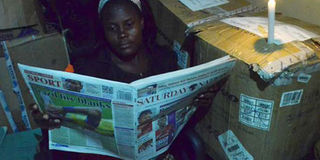Public anger rises as Kenyans wake up to 5-hour countrywide blackout

A shopkeeper in Mombasa struggles to read a newspaper despite darkness after a power outage on August 6, 2016. PHOTO | KEVIN ODIT | NATION MEDIA GROUP
What you need to know:
- However, after five hours power was first restored in North Rift, Western, South Nyanza, Mt Kenya and Central Kenya from 10 am.
- A flight to Eldoret scheduled to depart at 6.30 am was delayed and left at 7.20 am because passengers could not be cleared in time to board their flights.
The country was plunged into total darkness following a countrywide power outage early Saturday morning, which lasted for five hours.
The blackout, which affected all sectors of the economy, outraged Kenyans, with many taking to social media to call for an end to the monopoly enjoyed by Kenya Power.
“Power outage for over 8 hours is not good for the economy. The frequency at which it is occurring is alarming,” Twitter user Judy Nguta wrote.
“There is a valid reason Kenya Power removed Lighting from their name,” Ms Muthoni tweeted.
In a statement, Kenya Power said the outage occurred at 5.34 am following a technical hitch.
“A technical hitch which led to the tripping of our main supply line – Olkaria Nairobi 220KV – led to a power outage in most parts of the country,” KP said.
However, after five hours power was first restored in North Rift, Western, South Nyanza, Mt Kenya and Central Kenya from 10 am.
The blackout added more chills to the cold Nairobi weather, with residents and businesses suffering in different ways.
Nakumatt Supermarket’s branch at the Thika Road Mall suffered losses after being forced to open at 2 pm.
A guard at the mall told the Sunday Nation that the six generators serving the building, which have been very reliable before, failed to start when the power outage occurred.
This forced the Nakumatt management and other businesses in the mall to close until power was restored.
A few customers waited patiently as the opening time drew near. Among them was Ms Caroline Sau, who had travelled from Juja.
“I wish they opened sooner so that my day’s schedule isn’t interfered with,” she said, adding that the supermarket was her preferred shopping spot during weekends.
The streets of Nairobi were abuzz with roars of power generators. On the Kimathi Lane, a small generator was labouring outside one building to provide power to a set of stalls.
INCREASE IN CHARGES
There were reports of flight delays of up to 40 minutes at the Jomo Kenyatta International Airport (JKIA) following the blackout.
A flight to Eldoret scheduled to depart at 6.30 am was delayed and left at 7.20 am because passengers could not be cleared in time to board their flights.
“Our generators, which are meant to automatically provide alternative power, failed. We manually rectified the problem,” said KAA.
“Power is back at the airport and our teams are working on clearing the long queues being experienced. We are investigating to establish why the generators failed to automatically pick after this morning’s outage,” KAA said in a post on its Twitter account.
The power outage also affected operations at the Port of Mombasa.
Kenya Ports Authority Managing Director Catherine Mturi-Wairi said the State corporation used cranes in the ships to offload cargo as they could not use the ones off-shore.
“The port has generators but the power is too low to power ship-to-shore cranes,” she said.
Businesses too suffered massive losses. In Mombasa, Curio Paradise proprietor Abdulmajid F. Jahadhamy said the blackout affected business.
“We served a negligible number of customers; we have been forced to use a torch to show our merchandise,” he said.
In Lamu, business people led by Abdalla Saary, the proprietor of the Nurulyaqueen General Merchants and Enterprises, said the blackout had caused them huge losses.
In Malindi, businesses that resorted to using generators increased their service fees to cater for the fuel expenses as many affected businesses including barber shops, pressure car wash bays, salons, cyber cafes and welders closed shop.
Mr Philip Magara, who operates a barbershop on the Malindi-Lamu road, told the Sunday Nation that he increased the service fee from Sh150 to Sh300 per person.
BUSINESS INTERRUPTED
The same also applied to cyber cafes which increased their minimum charges from Sh20 to Sh50.
In Kisumu, businesses were disrupted as hotels, salons and barber shops and food joints were forced to shut until electricity supply was restored shortly after midday.
“Being a Saturday, many clients booked in for various services early. But since electricity is key in our business, we had to delay a great deal. We may be forced to work till late to attend to every client,” said Ms Clarice Atieno of Haven Salon at Kisumu’s Lake Market.
Scottish Tartan director William Mc Tough said the power loss delayed food preparation.
“Since there was no notice that power would go off, it took time before we could find alternative means to get foods like French fries done,” said Mc Tough.
“To have all food ready by midday, we usually start work at 5 am. But the blackout destroyed our day’s plan a great deal,” said Joan Atieno who runs an eatery at Winmart.
Hotels and guest houses that do not have generators were inconvenienced as they had to boil bathroom water and deliver it to their clients in the rooms while others had to contend with cold water.
Reporting by Elvis Ondieki, Anita Chepkoech, Ouma Wanzala, Mwakera Mwajefa, Kalume Kazungu





